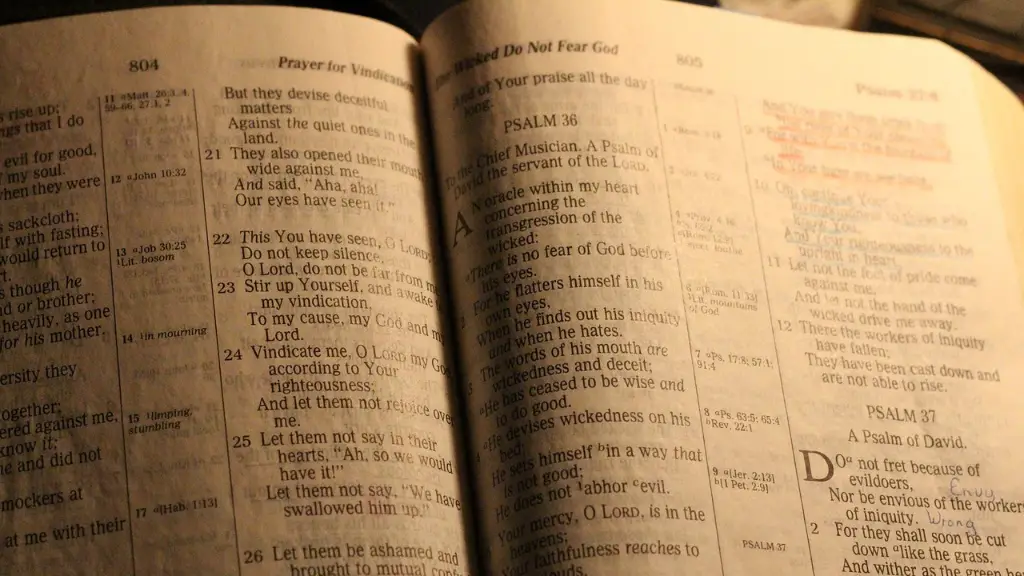The Bible is filled with scripture about forgiving one another. Jesus said in the book of Matthew “If you forgive others their sins, your heavenly Father will also forgive you. But if you don’t forgive others, your Father will not forgive your sins ” (Matthew 5:38-39). This is the ultimate commandment when it comes to forgiving, and by following it closely, believers can have assurance that they are forgiven and in turn, able to forgive.
The Bible reminds us that although forgiving someone can be difficult, God tells us that when we chose to forgive, it shows us and others that we are following the example that Jesus has set for us. And when we perservere in our efforts to forgive, God can use us to influence others, who may not understand the power of God’s love and the impact of forgiveness.
The Bible also speaks to the benefits of forgiving others. In the book of Colossians, Paul writes: “God made Him who had no sin to be sin for us, so that in Him we might become the righteousness of God” (2:13-15). When we forgive someone, we are recognizing that everyone has done wrong and, in doing so, realizing that all Christians are each forgiven in their own right. This brings about a sense of humility, understanding, and harmony amongst believers, which is often beneficial.
In addition to these benefits, the Bible provides several reminders about why the goal of forgiveness is so important. Forgiveness gives us closure, allowing us to move forward in life without the weight of resentment and bitterness. Moreover, forgiving someone gives us the opportunity to heal, allowing us to explore our emotions, take ownership of our experiences, and grow as a person.
At times, it can be challenging to forgive those who have wronged us. Scripture speaks to these moments, saying ” Bear with each other and forgive one another if any of you has a grievance against someone. Forgive as the Lord forgave you” (Colossians 3:13). This commandment is miles deep. Our willingness to forgive, no matter the extent to which someone has wronged us, unlocks a power of compassion that is immeasurable.
Unconditional forgiveness in the Bible lies at the foundation of grace. It is our responsibility as believers to forgive others “just as in Christ God forgave you” (Ephesians 4:32). We are to extend the same kind of grace to those who have hurt us, as God has extended His grace to us. All-encompassing forgiveness does not mean we forget or deny the wrongdoing, but instead encourages us to take ownership of our defenselessness and find contentment in ourselves.
Forgiveness is an essential part of a life of faith and is based upon an unwavering faith in the mercy of God. In the book of Luke, Jesus says, “Father, forgive them, for they do not know what they are doing” (Luke 23:34). In this, Jesus gives a model for how to forgive those who have wronged us. Jesus set an example of courage, mercy, and compassion.By following this example, we can find the strength to open our hearts and forgive once more.
How To Forgive
Forgiving someone is more than just accepting what has happened, it is finding a way to authentically release a person from their offenses and allow them to move on. Forgiveness may not always be easy and requires that each person is honest with themselves and takes responsibility for their mistakes. Doing so will help to move forward in the process of healing. Here are a few steps that can help in the process of forgiveness.
First and foremost, it is important to focus on your own healing and self-care. This can include seeking professional help, getting regular exercise, meditating, and spending time in nature. It is also helpful to consider the actions and motivations of the person who hurt you in order to see the whole picture and try to understand their perspective.
It can also be beneficial to confront the person who wronged you directly. Doing so can help to humanize the offender and foster a larger understanding of why the offense occurred. Then, if possible, forgive them both in your mind and in your heart. It is also important to practice forgiveness over time, as this can help you let go of any anger and accept the situation. Finally, it is imperative to remember that forgiveness is a personal journey, and the amount of time it takes to forgive someone may vary between individuals.
Scriptures About Forgiveness
The Bible is a source of strength and inspiration when it comes to understanding and forgiving others. Here is a list of scriptures that can help in the process of forgiving:
- Proverbs 19:11 – “A person who has understanding is patient – it is to one’s glory to overlook an offense.”
- Isaiah 43:25 – “I, even I, am he who blots out your transgressions for my own sake, and remembers your sins no more.”
- Psalm 147:3 – “He heals the brokenhearted and binds up their wounds.”
- Romans 5:8 – “But God demonstrates His own love for us in this: While we were still sinners, Christ died for us.”
The Role of Forgiveness in the Church
A church plays an important role in the forgiveness process, offering guidance and offering practical tools to help its members to grow in the journey of forgiveness. Church leaders should make an effort to facilitate conversations on forgiveness and give members a platform to express their own experiences with forgiveness. Doing so can help members learn from one another, understand why they should forgive, and provide a safe space to practice the art of forgiveness. Furthermore, churches can create books, workshops, and bible studies on forgiveness to explore the stories, advantages, challenges, and power of forgiveness.
Although there are diverse views on forgiveness in the church, many Christians agree that forgiving each other is essential to having a vibrant and healthy relationship with God and with one another. This is because, in Christianity, forgetting our past sins is just as important as forgiving those who have wronged us. Forgiveness is necessary for spiritual and emotional growth and brings about redemption, righteousness, and harmony between believers. When done correctly, forgiveness is a powerful tool that can help us to restore and revive our relationship with God and with one another.
Actions To Take When Forgiving Someone
When it comes to forgiving someone, it is essential to remember that forgiveness takes time and practice. Here are a few tangible things we can do to forgive others:
- Pray for the person who hurt you, and pray for yourself, asking God to open your heart to all the possibilities and changes in your life.
- Write down your thoughts and feelings surrounding the offense, as writing can be a powerful tool in healing and forgiving.
- Find an example of forgiveness in the Bible and meditate on it, as Jesus is our guiding light in the process of forgiving.
- Do something for the person who wronged you, as offering a gesture of kindness can be a powerful sign of forgiveness.
- Seek counseling if needed and talk to people you can trust, such as a minister or spiritual adviser, as their perspective and experience can be incredibly helpful during this time.
How to Live a Life of Forgiveness
Living a life of forgiveness starts with recognizing and accepting that each individual is capable of making mistakes and behaving irrationally in difficult situations. It involves being mindful of our actions, as well as forgiving ourselves when we make mistakes. It involves understanding our emotions and projecting compassion towards others as often as possible. It involves recognizing our defenselessness, seeking understanding in all things, and recognizing that everyone is on their own journey.
Living a life of forgiveness is not an easy task. It requires self-awareness, patience, and faith. It requires channeling peace, love, and grace in order to have a healthy relationship with ourselves and with God. It requires living a life in line with the word of God and putting the needs of others before our own. Doing so is essential to maintaining a life of inner peace and strength.
The Impact of Forgiveness
Learning to forgive those who have wronged us can be an incredibly liberating and transformative experience. It enables us to heal the wounds of the past and set a course for a healthier future. It can help us to move forward in our faith journey and find strength in ourselves and in others. It can help us to move beyond our hurt, find joy in life, and appreciate the beauty of our faith.
Learning to forgive and being willing to extend this same grace to others can have a tremendous positive impact on our lives. It can help to increase self-esteem, reduce stress and anxiety, enhance our relationships, and foster harmony amongst believers. Doing so could prove to be the catalyst in experiencing a meaningful and fulfilling life.




